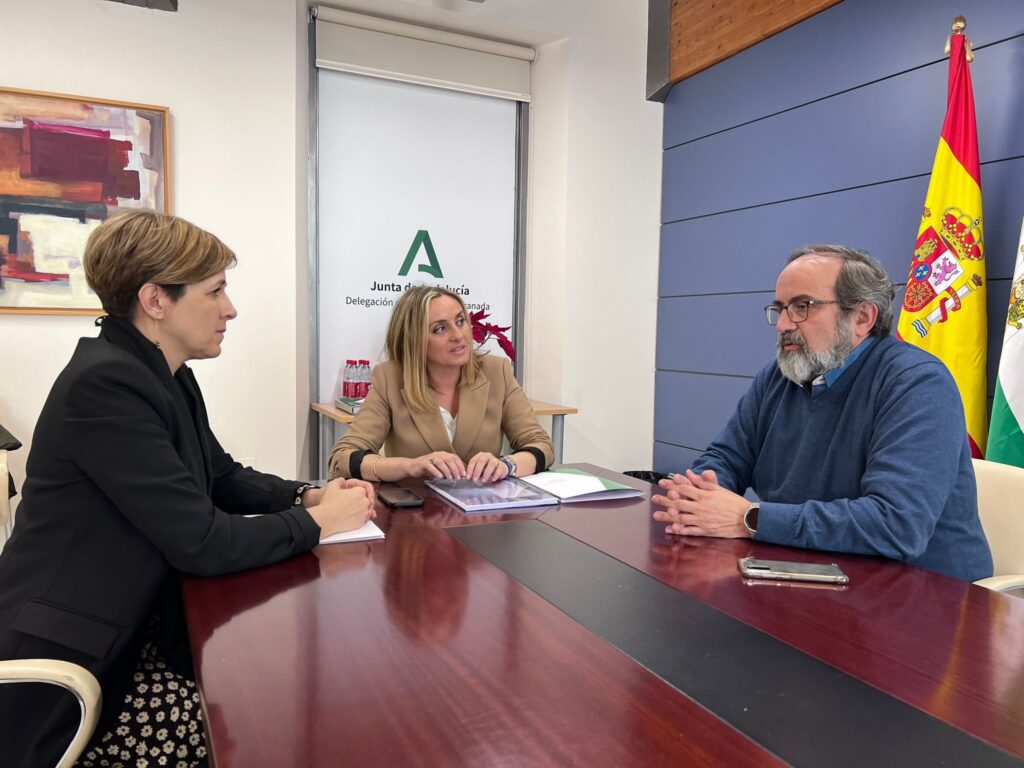The Andalusian Regional Government launches a Strategic Plan to take advantage of the implementation of IFMIF-DONES in Escúzar
Posted on |

The Andalusian Regional Government has commissioned the Parque Tecnológico de la Salud (PTS) to draw up the Strategic Plan to outline local and regional development around IFMIF-DONES, a scientific infrastructure of international relevance that is planned to be built with a global investment of 862.47 million euros in Escúzar. The Regional Minister of Development, Territorial Planning and Housing, Marifrán Carazo, has held a meeting with Ángel Ibarra, Director of the IFMIF-DONES Consortium Spain, and Ana Agudo, Director of the PTS, to convey this new commitment of the Andalusian Government with which “we want to make the most of a project that will place Granada at the forefront of science, as well as being a catalyst for job creation in the province”.
The Councillor for University, Research and Innovation, José Carlos Gómez Villamandos, recalled that a few days ago, the Governing Council gave “important backing to the project” with its inclusion in the Project Accelerator Unit (UAP) of Strategic Interest in Andalusia, to “speed up all the procedures for the implementation of this infrastructure”, as it is “a strategic proposal that undoubtedly contributes to stable and quality employment”.
Marifrán Carazo has emphasised the “multiplier effect” this project will have on the arrival of new companies, which is why the Andalusian Regional Government is working on this Strategic Plan. IFMIF-DONES will have a significant impact on national and regional economic activity due to the expenditure that will be incurred for its development, as it will increase the demand for goods and services directly, indirectly and induced in most sectors and, therefore, will lead to an increase in production, employment and Gross Value Added (GVA). However, since the European Union leads it, several European countries, Spain and Andalusia, will benefit from this impact. In the case of Spain, its production of goods and services will increase by 6,133 million euros (79% of the total generated), which will raise GVA by 2,752 million.
The estimated economic impact of IFMIF-DONES in Andalusia amounts to 4,156 million euros (53.5% of the total expected in Europe), with a generation of 35,663 jobs and a Gross Value Added (GVA) of 1,792 million euros. “In Granada alone, production is expected to grow by 1,945 million euros, with almost 12,000 new jobs”, the Regional Minister of Public Works and Transport pointed out.
Given this scenario, the Strategic Plan will set out the lines of action necessary to accelerate this development and maximise the positive impact of this infrastructure’s implementation. In addition, it will also include contributions from the Granada Chamber of Commerce’s technical experts.
“This plan will be a living plan, with a medium/long-term development”, said the Councillor. For this reason, she indicated that this plan would be reviewed every two years, aligning the actions with the evolution of the IFMIF-DONES. The project will be carried out in three phases over 34 years. The first, the construction phase, will last nine years, and, once completed, the operations phase will begin, which will last for 20 years, from 2030 to 2050.
To draft the Strategic Plan, a working team will be set up comprising representatives of local institutions, the local business community, the IFMIF-DONES Consortium and the business community linked to scientific infrastructures (INEUSTAR). The working methodology will be based on several phases, starting with benchmarking, i.e. a study of territories where a singular infrastructure has been installed, as well as studies that assess the strengths and weaknesses of the project (PESTEL and SWOT analysis). Finally, a strategic map will be drawn up, and the essential metrics and indicators will be defined to determine the impact of the planned actions.
Other positive impacts on the territory
This scientific facility will impact companies not only because of the increase in demand for goods and services but also because of the knowledge it will provide them with, enabling them to innovate with the consequent increase in their profits and market value. Apart from these impacts, other equally relevant implications in the field of fusion technology research justify the execution of the IFMIF-DONES project since this experience will provide the basis for the materials database created with the information obtained in the irradiation experiments. In the environmental sphere, it will promote scientific progress related to sustainable development. Furthermore, with this facility, the community will lead a new energy model in the face of the current climate crisis since nuclear fusion is a clean, safe, sustainable energy source with the capacity to produce sufficient quantities to supply the needs of large population centres and is based on an inexhaustible fuel.
On the other hand, in terms of human capital, the professional projection of Andalusian researchers will be enhanced. The qualification and experience of postgraduate students carrying out doctoral theses related to fusion at the University of Granada and other regional academic institutions will be improved. In addition, this infrastructure will positively impact the image and visibility of Granada, strengthening its capacity to attract researchers and technologists, as well as innovative companies.
Source: Junta de Andalucía

